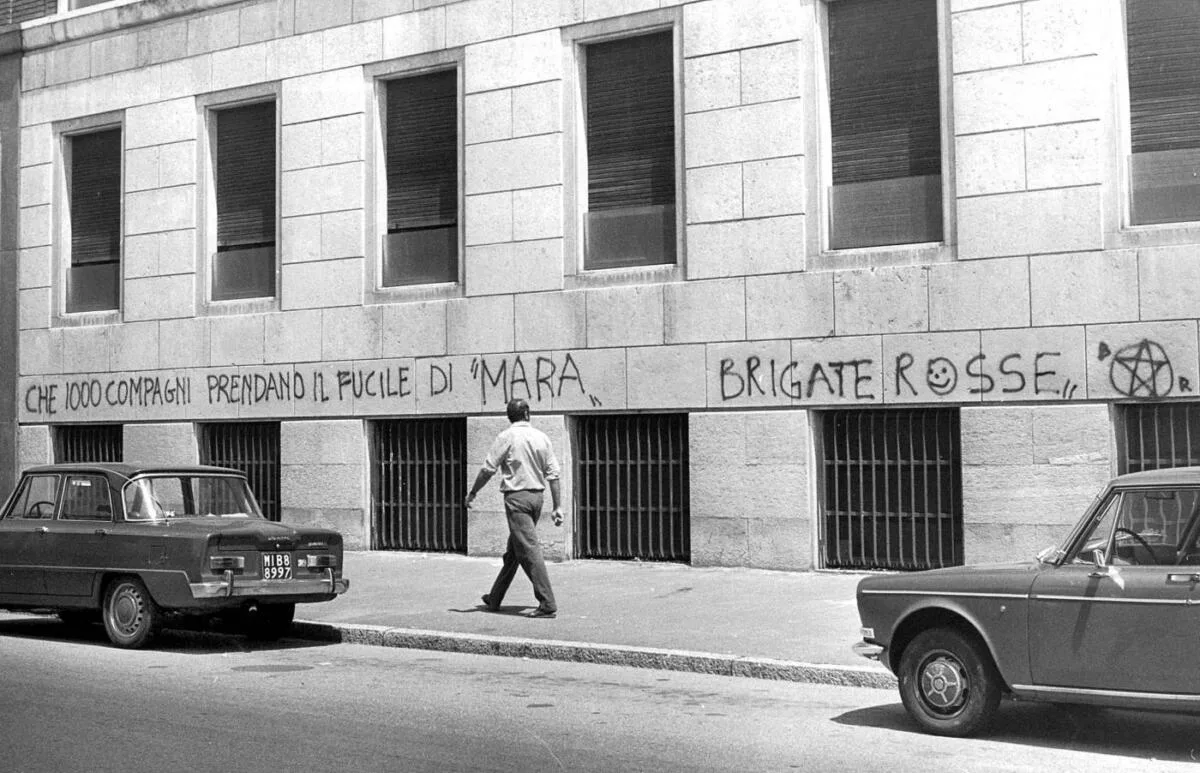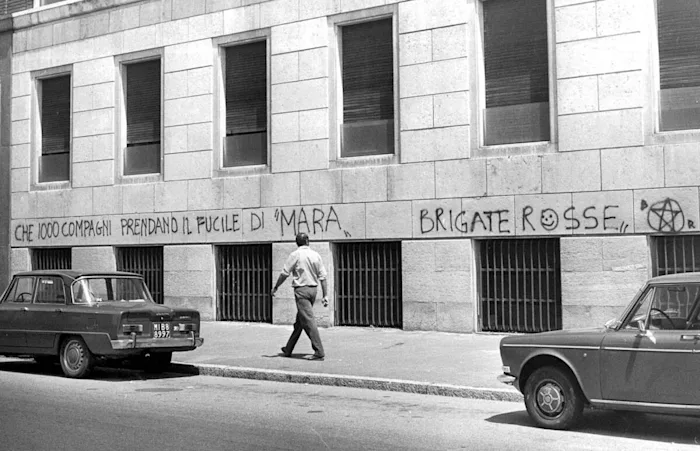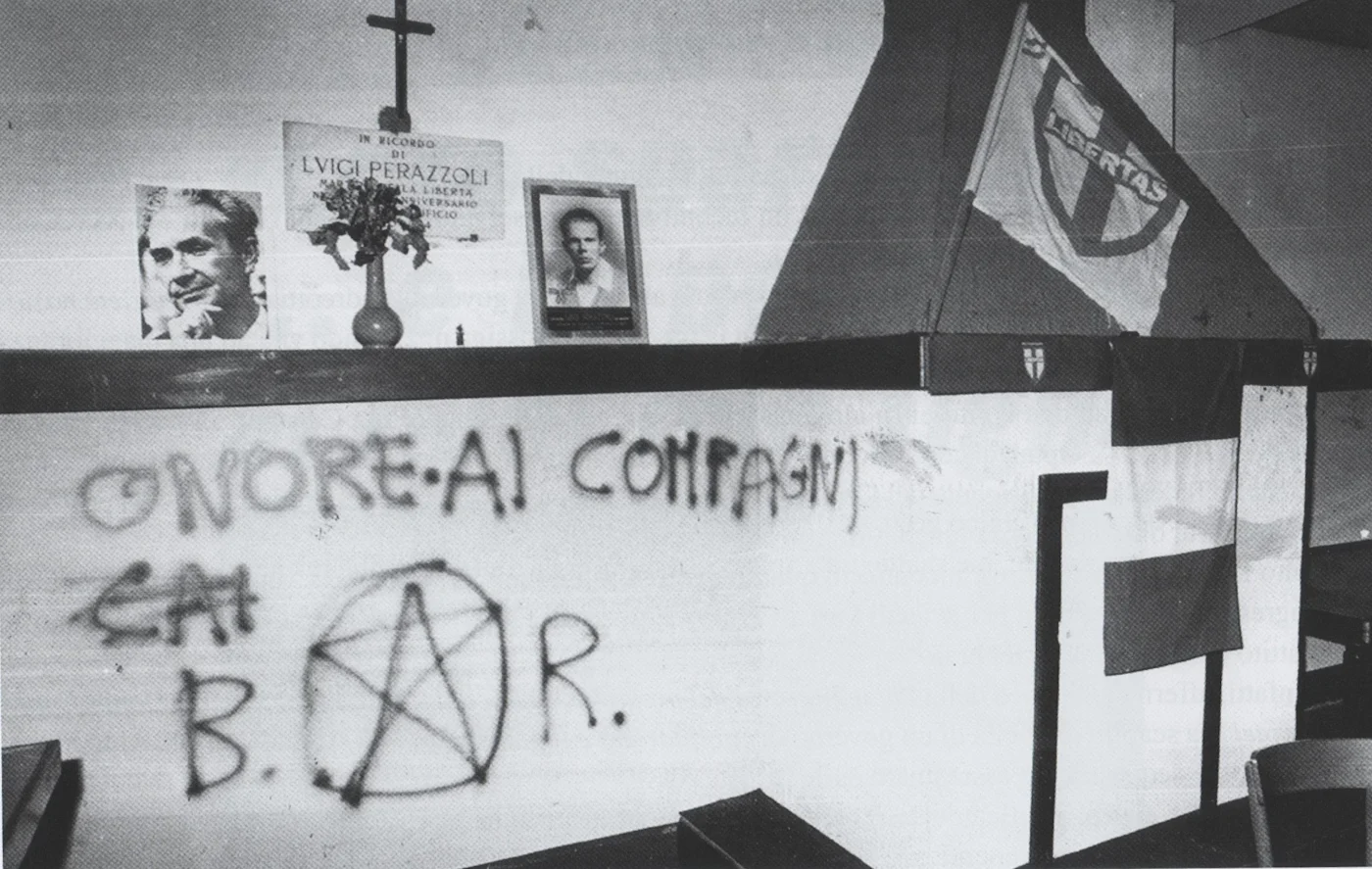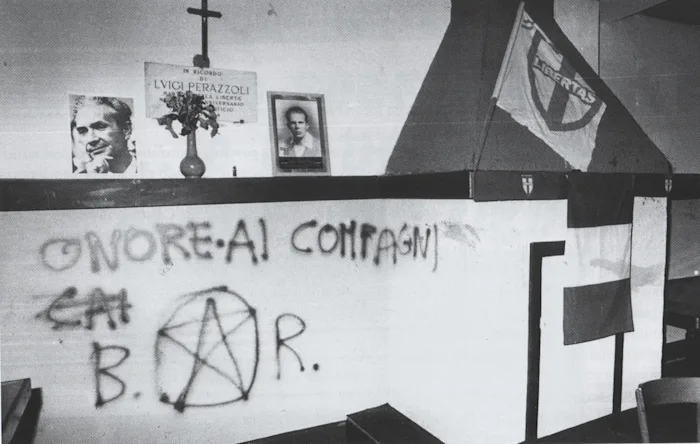Terror and the Political
Mario Tronti
The following is an excerpt from a new collection of writings by and upon Mario Tronti entitled Vocations of the Political, edited and translated by Howard Caygill. In this discussion from 1980, Tronti lays out a criticism of left wing terrorism. Refusing the reductionist trap of psychologism, Tronti argues that terrorism emerged "from within the problems of the left” as a reaction and backlash against a blockage in the real movement of rupture and transformation.
Mario Tronti: There is no doubt that for a macroscopic phenomenon like terrorism the causes must necessarily be objective ones.1 In this I agree with Mahler, who sees these causes in the left even in the ideology of left, claiming that ‘terrorism is a symptom of the ideological crisis of the entire socialist movement and no one may absolve themselves from this responsibility.’ Thus I too accept (with Amato) that to deal with terrorism it is necessary to account for it realistically, as part of the problems internal to today’s left. Just as I am convinced of Mahler’s other claim that complements it, namely that ‘only the left can truly overcome terrorism’. It is a lapidary claim that we cannot avoid sharing.
I am, however, less open to those arguments about the causes of a ‘terrorist personality’ laid out by Bolaffi. These bring together the echo of a romantic critique of capitalism and an existential discourse just a little too ‘Frankfurt’ for me, in which the ‘authoritarian personality’ becomes today’s ‘terrorist personality’.
Such an approach might be of interest for analyzing the development, growth and crises of an individual terrorist, but by this route we will not get to the basic causes of terrorism.
And perhaps this is because of the risk of giving the terrorist the image of a child of crisis. Such images are for me too general to be productive of a politics, even if this crisis — if only — was considered in Habermas’s sense of a crisis of legitimation. Mahler’s analysis goes deeper into the objective causes when he attributes to the left a certain incomprehension of social complexity, and for me as for Amato especially when he confronts the fundamental cause that is the utopia of the destruction of the state. Amato speaks of the ‘need for the state’. According to me, simultaneous to the need for the state that at the level of the mass is provoked by terrorism, there was perhaps preceding an opposed need in the terrorist subject, that of the destruction of the state and a taking up of opposition to the state in reciprocally destructive terms.
Here we enter perhaps into the merits of the interrelation between the terrorist phenomenon and the theoretical traditions of the workers’ movement. There is no doubt that the direct attack on the existence of the state was a central thread of the workers’ movement; this cannot be denied. Its matrix is to be found in Marx’s politics, he who had not even developed a theoretical model of the state but had peddled an image of the bourgeois state as only an apparatus of domination, oppression and thus of repression. There was no discussion of the concept of the state machine within which it was possible to find even the moments of government, of mediation and of democratic command but just the idea of the state apparatus, the ‘committee for managing the affairs etc.’, which is a militarized view...
Giuliano Amato: ...that concerns solely the monopoly of force, whose legitimacy is only put in question when that monopoly is not recognized...
Mario Tronti: ...and whoever feels excluded from this monopoly of force has basically the right to use the same arms of violent state oppression to free themselves.
But what is here a bare reference to Marx’s politics becomes a tradition in the Stalinist version of Marxist–Leninism which accepts the terrain of the state in so far as it intends to use it fully, whether to construct another kind of society or to defend this alternative kind of society from other states. It is the matter of a logic of developing the fact of the state in terms of force, of violence and thus of reciprocal force and violence.
Certainly all this throws up in the air the classic bourgeois theory of the state, which was behind this theoretical analysis of the workers’ movement. To sum up, I have the impression that with the terrorist phenomenon there comes to the surface a tie between the state and the political that adopts the same violence that the state always historically contained within itself. […]
Having already discussed a certain tradition to which we attribute the terrorist phenomenon we should, for the sake of a better understanding of it, underline its novelty. We find ourselves before new forms of political struggle, especially in Italy, if we want to call them this — new forms that break with the same tradition of the workers’ movement in which, given that we theorized violence, we never reduced it to a private matter, as do the terrorists.
I criticize the limits of terrorist violence and not violence in general. The limits of terrorist violence are precisely its reduction to a relation between a private force and the state. This was never the case with the workers’ movement. Whenever there was resort to violence this was always considered as a public instrument – that is, a political instrument, never as in terrorism.
Real political violence, that which sustains a relation of forces, resolves itself in a conflict that is not always peaceful, but this political violence is not terrorism, even if it is a theorization of civil war, in the sense of class conflict, between social forces. [...]


I would make an important distinction between the causes of terrorism, objective causes, and the horizon within which they are situated. As Mahler says, terrorism is a phenomenon that forms part of the left, but that doesn’t mean that the causes of terrorism are intrinsic to the left; it’s useless to continue to imagine that Meinhof or Curcio are manipulated by a puppet master, preferably of the right, who is using them for other ends. Evidently the ‘terrorist personality’, if we wish to continue using this term, grows from within the problems of the left even if the general causes of terrorism are larger, and above all much larger than the political uses of terrorism.
Bolaffi has quite correctly proposed a sharp alternative: are the causes of terrorism to be sought in a drive for transformation or in a block to its process? Faced with this choice I do not entertain much doubt: the real cause is the second. For if we say that terrorism issues positively from a drive to transformation then we give it a dignity that, according to me, it does not merit, because we make it a positive phenomenon that expresses something, perhaps in a mistaken way. This is a thesis that does not hold and is unacceptable, not for moral reasons but because I think it is objectively mistaken. The other hypothesis is more productive, that in the face of a block to the process of transformation it is possible that a reaction such as terrorism might emerge.
We must, however, situate all this within a larger and complex context that is the capitalist manoeuvre that has been grafted — with a powerful charge of initiative — onto the mass struggles of 1968–69 and as an active response has consciously and politically changed the class composition. With the result that it has produced a new social terrain, a social that is different but no less complex than that of the past, but certainly more political. (As I see it, the thematic of ‘social complexity’ does not help much; it’s a nice phrase and easy to use.) This process of the politicization of the social is derived not only from the push of the great struggles that at the end of the 1960s forced a block upon power and disrupted its equilibrium, but also from the system’s subsequent reaction.
Thus there emerged a stronger political call for change, but at the same time as the impossibility of this call prevailing became ever more evident in spite of the growth of the left and the changes in general social consciousness. It was seen that it was impossible to win a deepening of the terms of democracy using the arms provided by the existing political system. From this block in the process of transformation sprang the leaks that constituted the specifically Italian version of the terrorist phenomenon, in the sense of a difficult nut to crack since it created a kind of mini social bloc between a clandestine nucleus and — differently from other countries — a minimum of social consensus.
Also, the same difficulty that we as a communist party often identify as a zone of indifference with respect to terrorism among intellectuals and the marginalized can be said to express in reality the diffused sensation of this block in the process of transformation. The idea spreads that old cards of the democratic game are no longer able to win, and this produces a backlash. […]
Let’s take as another point of departure the hard core of terrorism that is the Red Brigades. For me the Red Brigades are an entirely political phenomenon whose internal structure repeats a political structure that diverges considerably from recent bourgeois politics, from capitalist politics. In fact the clandestine structure of the Red Brigades stands for a state, a state form; in the end theirs is a state apparatus that would claim a monopoly of alternative force to that of the state. But the central question is that the image of the state that the Red Brigades adopted no longer corresponds to the contemporary political state and, above all, does not correspond to the field larger than the state which is that of the political that contains and exceeds the fact of the state. We find ourselves before a divergence in the very terrain of the political itself: the tradition of state force, of the totally violent state, is adopted by the clandestine structure of terrorism while the traditional state has adapted itself to the mutations and social transformations of these years, giving itself indeed the instruments to pursue politics that correspond to all the folds of society.
Togliatti’s view of a politics that corresponds to all the folds of the social has been applied in Italy by the Christian Democrats, by their system of power, which is to say by a type of politics that adapts constantly and does not follow rules of principle or values but pragmatically adheres to flexible and adaptable issues. But this proceeds in parallel with another complex of phenomena, which are all real social transformations accomplished in these years.
From the reformist defeat that preceded the actions of the late sixties — 1968 to 1969 — a movement emerged that did not propose a new reformism but wanted more; it wanted moments of rupture though not general or revolutionary rupture, but rather real and material ruptures in the Christian Democrat system of power, to intervene and put it in crisis, which is exactly, at certain points, what seems to have happened. Afterwards, though, the response to this demand for a real rupture was the attempt to construct within the political system a new level of reformism through the strategy of the historical compromise. This created further rigidity precisely in the interior of those forces within which the terrorist phenomenon would explode.
But beside this there is a political system that is weak at the level of government while wanting to maintain intact the force of the state without achieving it: weakness of government, force of the state and, beside this, the thing most visible to everybody, a miserable political class that for me is a determinate element in the flight towards ‘mad’ solutions such as political terrorism.
What, then, is the limit of this political democracy that we confront today? Is it the fact that it cannot become a subject of transformation — it just can’t — but instead is invested by social transformations initiated by others, by in part autonomous social forces and relations, which it is limited to only registering passively. It is a political democracy that reacts but does not act; reacts in the sense that it is still able to mobilize itself, as we have seen, when it is directly attacked. It is a democracy, in this vital sense, that has strong moments of reaction but does not attack social and political structures. Thus it is not an active element.
It is this that produces gaps between political democracy as it is today and the drive from within where the terrorist area emerges. There are many reasons for this. For example, I see in this reactive capacity a strong passive legacy of anti-fascism, as a defence of values rather than active instruments of intervention in social relations — defence of values that no longer correspond to the growing political sense of the masses.
We find ourselves, then, before an entirely political phenomenon that wants a response, but a political one. For this reason I remain as unconvinced by social analyses of terrorism as by the idea that it can be brought to a head by a non-political response. [...]


Angelo Bolaffi: Instead might we begin to consider terrorism as part of some Hegelian ‘cunning of reason’ through which, or in the name of which, the political system might think to practice a real reduction of the complexity of political demands, such as the level of democracy and restrictions on the movement of the working class and of new political movements?
Mario Tronti: You say there is a ‘cunning of reason’. Let’s recall that a few months ago there was a date on proposals for institutional reform in which we were all in some way interested. Now the increase in this terrorist phenomenon has, among other things, had the result of completely blocking this debate, shifting it to second place and initiating, day by day, a kind of creeping institutional counter-reformation without definite projects, one that attempts to modify some rules of the game and to favour certain laws, as demonstrated by the latest decree on terrorism.
We have two kinds of response to terrorism: one is penal, the other ideological. For the first, it does not particularly bother me that this kind of response justifies terrorist strategy, according to the idea that it is the response terrorism wishes to provoke, aiming at broadening the process as authoritarianism gets tighter. My real worry with the first response is that it closes the space of movement for the struggle in general, for the process of transformation, and in this way risks justifying clandestine nuclei that work with the hypothesis of the closure of any real movement and of the struggle in general.
Then there is the other type of response, the ideological. This response holds that appeals to national unity and solidarity joined with the values of the political system, just as it is, will in the long run sap the forces of terrorism. This is a solution that surely will not resolve the problem of terrorism and may even aggravate it by serving as a multiplier of terrorism. Let us remember that all of the phases in which the process of national unity seemed to be accelerating were also those of the growth of terrorism. […]
I believe instead that a process of reaction is initiated spontaneously that is then used by the forces of the system. Thus, if terrorism is a political phenomenon, it is a matter of removing its political basis and, for me, this can be done only by the relaunch of an idea or project and an organization of the forces of the left.
This must be a project of transformation with adequate instruments and new forms of organization, something unprecedented that does not just repeat old models. If it is true that the model of clandestinity with a minimum of social consensus is what is specific to Italy, then the first thing to do is to cut this tie — that is, remove the minimum of consensus from the clandestine nuclei, completely isolate it as what it is. Only in this case can a military response be effective — that is, after the isolation of the hard core of terrorism. It is clear that neither of the two elements can be eliminated, but the first is the political one. [...] Only the left can defeat terrorism. In this sense we must as the left adopt the strongest sense of the concept of political transformation, but instead we have for a long time tied this concept of transformation always and only to the social or to the overcoming of an economic model. Transformation in Mahler’s sense — that is, one that does not fear approaching institutional equilibria if there is an alternative that is not impossible — that is to say a different political and institutional system intelligible to the masses and hence capable of gathering together new forms of social consensus.
Now, the level of government is one that is adopted, let us say, in terms less tactical than hitherto and more in strategic and projectual terms. That is to say, to bring out a level of managing contradiction that will also bring with it efficiency and democracy at the same time. This does not seem to me to be something impossible to achieve, given the body of experience and theoretical refinement that the workers’ movement possesses, especially in Italy.
To construct a project for a democracy in transition, for a democracy that decides and is able to resolve contradictions and not assume them passively and to just register them, is a democracy that can win against the opacity of social relations in the sense that it gives the measure for the possibility of change.
That’s what needs to be done. After which the terrorist phenomenon will be reduced to a minority matter that can be beaten with the normal instruments of any kind of functional state.
Translated by Howard Caygill
Cover: Stefano Lee
Notes
1. Editorial Note: These remarks constitute Tronti’s contribution to a debate with Giuliano Amato, Angelo Bolaffi and Stefano Rodota, ‘The Italian Left and Terrorism’, on the publication of the Italian translation of Horst Mahler’s For a Critique of Terrorism (Per la crítica del terrorismo, Bari: De Donato, 1980). They offer valuable insights into Tronti’s views on power, politics, violence, his critique of terrorism, the significance of the social movements of 1968, and Rossana Rossanda’s argument that the disappointment of the aspirations of 1968 was a major cause of the resort to a politics of terror.↰